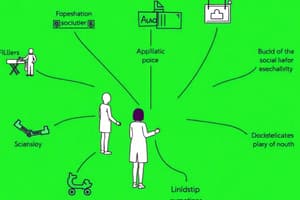Podcast
Questions and Answers
What does the theory of the Looking-glass self emphasize about individual perception?
What does the theory of the Looking-glass self emphasize about individual perception?
- Individuals develop self-perception solely through personal reflection.
- Interactions with others influence how individuals perceive themselves. (correct)
- Self-perception is fixed and does not change over time.
- It is primarily shaped by cultural norms and not personal interactions.
According to Freud's psychoanalytic theory, which component of personality is responsible for social morality?
According to Freud's psychoanalytic theory, which component of personality is responsible for social morality?
- Id
- Superego (correct)
- Conscious
- Ego
In which agent of socialization do individuals first establish close emotional ties?
In which agent of socialization do individuals first establish close emotional ties?
- Family (correct)
- School
- Religion
- Peer Groups
What role do peer groups play in socialization?
What role do peer groups play in socialization?
How do schools contribute to socialization?
How do schools contribute to socialization?
What aspect of religion is crucial for socialization?
What aspect of religion is crucial for socialization?
Which of the following is not considered an agent of socialization?
Which of the following is not considered an agent of socialization?
What is the process of self-actualization primarily associated with?
What is the process of self-actualization primarily associated with?
What defines mores within a society?
What defines mores within a society?
How does ethnocentrism affect the perception of other cultures?
How does ethnocentrism affect the perception of other cultures?
What is the main purpose of norms in a society?
What is the main purpose of norms in a society?
What distinguishes taboo from other forms of norms?
What distinguishes taboo from other forms of norms?
What does amalgamation primarily involve?
What does amalgamation primarily involve?
Which of the following accurately describes stratification in society?
Which of the following accurately describes stratification in society?
What differentiates xenocentrism from cultural relativism?
What differentiates xenocentrism from cultural relativism?
What does the status set of an individual refer to?
What does the status set of an individual refer to?
Which of the following best describes cultural relativism?
Which of the following best describes cultural relativism?
Which mechanism of social interaction is characterized by copying an action of another?
Which mechanism of social interaction is characterized by copying an action of another?
Which of the following represents an idea in the context of language?
Which of the following represents an idea in the context of language?
What are folkways in the context of societal norms?
What are folkways in the context of societal norms?
Which type of status is involuntarily received at birth?
Which type of status is involuntarily received at birth?
What is the primary function of social status in interactions?
What is the primary function of social status in interactions?
What does empathy allow an individual to do?
What does empathy allow an individual to do?
Which mechanism of social interaction refers to an authoritative influence on others' views?
Which mechanism of social interaction refers to an authoritative influence on others' views?
What does the term 'Degradation Ceremony' refer to?
What does the term 'Degradation Ceremony' refer to?
Which of the following best defines 'Enculturation'?
Which of the following best defines 'Enculturation'?
How does 'Assimilation' differ from 'Acculturation'?
How does 'Assimilation' differ from 'Acculturation'?
What best describes 'Cooperation' as a social process?
What best describes 'Cooperation' as a social process?
What is the goal of 'Differentiation' in a society?
What is the goal of 'Differentiation' in a society?
In which scenario would acculturation be most evident?
In which scenario would acculturation be most evident?
Which of the following is NOT an example of 'Cooperation'?
Which of the following is NOT an example of 'Cooperation'?
What would be an example of 'Enculturation' in a family setting?
What would be an example of 'Enculturation' in a family setting?
What distinguishes achieved status from ascribed status?
What distinguishes achieved status from ascribed status?
Which of the following is an example of a status symbol?
Which of the following is an example of a status symbol?
What situation exemplifies status inconsistency?
What situation exemplifies status inconsistency?
What does the term 'role set' refer to?
What does the term 'role set' refer to?
What best defines role conflict?
What best defines role conflict?
How can role performance vary among individuals?
How can role performance vary among individuals?
Which of the following individuals is likely to face role conflict?
Which of the following individuals is likely to face role conflict?
What function do status symbols serve in society?
What function do status symbols serve in society?
Flashcards are hidden until you start studying
Study Notes
Language
- A system of symbols that allows infinite combinations, representing objects and abstract thoughts.
Ideas
- Collections of thoughts generated in the mind.
Values
- Standards that define what is desirable or undesirable, good or bad, beautiful or ugly.
Beliefs
- Convictions about the reality of things.
Norms
- Shared rules and expectations that guide societal behavior, maintain order, define cultural values, and shape interactions.
Folkways
- Traditional norms governing everyday behavior; not formally codified as laws but passed down generations.
Mores
- Socially approved norms based on moral standards, representing unwritten rules of behavior.
Taboo
- Actions that are socially unacceptable and violate cultural norms, often enforced by society.
Laws
- Formalized social norms established by political authorities.
Ethnocentrism
- Belief in the superiority of one's native culture, judging other cultures against one's own values.
Xenocentrism
- Viewing one's culture as inferior to others, resulting in admiration for other cultures while disdain for one's own.
Cultural Relativism
- Analyzing cultures based on their own contexts to avoid bias and assumptions.
Society
- A group of people living in organized communities, sharing common laws, values, customs, and traditions.
Theories of Socialization
- Looking-glass self (Cooley): Individuals form self-perceptions based on how they are viewed by others.
- Psychoanalytic Theory (Freud): Personality is shaped by the interaction of the id, ego, and superego affecting behavior.
Agents of Socialization
- Family: Form the first emotional ties and instill values, language, and behavior.
- Peer Groups: Influence identity development outside adult supervision, exposing individuals to varied interests.
- School: Significant in teaching societal norms and facilitating self-actualization and skill development.
- Religion: Provides beliefs and guidelines for behavior, acting as a socializing institution.
- Degradation Ceremony: A ritual that strips an individual's identity to impose a new one.
Social Processes
- Forms of interaction that repeatedly occur in society.
Enculturation
- The process of learning or adopting the culture of one's community.
Acculturation and Assimilation
- Acculturation: Adapting to another culture while retaining aspects of one's own.
- Assimilation: Complete adaptation to a dominant culture, often losing one's original cultural identity.
Cooperation
- Working together toward a common goal, occurring in varying scales from personal to international levels.
Differentiation
- Allocation of specific roles and functions within society to achieve stability.
Amalgamation
- Formal union of groups or families, encouraging cultural blending.
Stratification
- Division of society into social categories based on wealth and income disparities.
Social Interaction
- Actions individuals take in each other's presence, encompassing direct and distant communication.
Mechanisms of Social Interaction
- Imitation: Copying actions or behaviors.
- Suggestion: Influencing others' views, often initiated by authority figures.
- Empathy: Understanding and sharing another's feelings.
- Identification: Fully immersing oneself in another's experience.
Social Status
- The position one occupies within a social group, influencing interactions.
Status Set
- All statuses an individual holds at a given time, which can change over time due to life events.
Ascribed Status
- Social positions assigned at birth or involuntarily during life, including race, ethnicity, and gender roles.
Achieved Status
- Positions attained through personal choice and effort, which can be positive or negative.
Status Symbol
- Visual indicators of one's social position, signaling status to others.
Status Inconsistency
- Occurs when an individual's various statuses do not align well, leading to social anomalies.
Social Roles
- Expectations of behavior linked to specific social positions or categories.
Role Set
- The array of roles attached to a single status.
Role Performance
- The individual interpretation and execution of societal roles.
Role Conflict
- Tension arising when roles from different statuses clash, necessitating difficult choices.
Studying That Suits You
Use AI to generate personalized quizzes and flashcards to suit your learning preferences.




